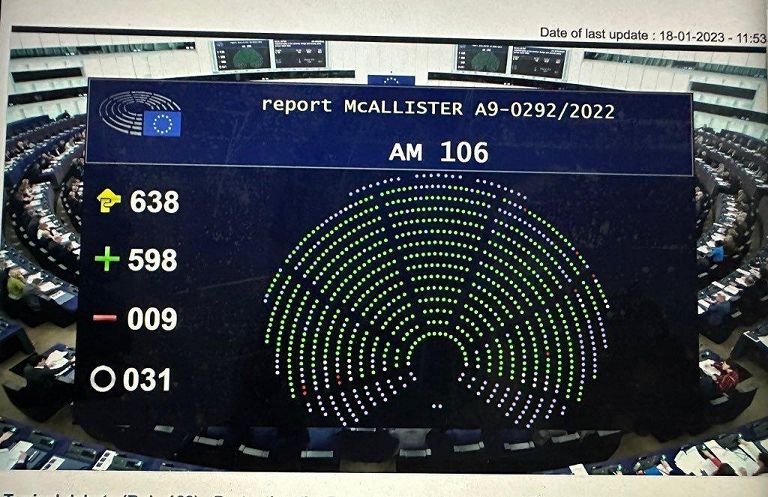European Sanctions Against the IRGC: Warning or Power Play
European Sanctions Against the IRGC: Warning or Power Play According to Iran Gate, the European Parliament considers the Islamic Revolutionary Guard Corps (IRGC) a terrorist organization. The Strasbourg General Assembly approved a resolution with an overwhelming majority that calls on the European Union and its member states to place the IRGC on the list of terrorists compiled by the EU. It is said that the IRGC is responsible for the deaths of at least 481 people since the protests began. The European Parliament has called for the inclusion of the IRGC in the list of terrorist organizations.
The proposed amendment by Anna Fotyga, a Polish member of the European Parliament representing the European Conservatives and Reformists group, was reported by David McAllister, Vice President of the European People’s Party (EPP), regarding the implementation of joint security agreements and EU foreign policy. It was approved at the Strasbourg meeting with 598 votes in favor, 9 against, and 31 abstentions. This vote does not obligate the EU to take action, but foreign ministers of EU member states are set to discuss intensifying sanctions against Tehran at next week’s meeting in Brussels.
An overwhelming majority that signals a new point of no return in relations between the Brussels Parliament and Tehran authorities. Equating the Islamic Revolutionary Guard Corps, a military institution founded in 1979 by Ayatollah Khomeini to defend Islamic institutions, with a terrorist militia group means delegitimizing a state body and ultimately the Islamic Republic itself.
In the text approved on January 18, the Parliament invites the EU and its member states to list the IRGC as a terrorist entity due to its terrorist activities, suppression of protesters, and sending drones to Russia. This encourages Brussels to blacklist the IRGC military forces, Basij militias involved in protest suppression, and the secret Quds forces dispatched to spread the Iranian revolution abroad.
And this will affect any economic and financial activities involving businesses and commercial activities related to or owned by individuals affiliated with the IRGC or the IRGC itself, regardless of the country in which they operate.
According to European Parliament representatives, the IRGC is responsible for the severe suppression of protests that began four months ago in Iran. This suppression has resulted in at least 481 victims, including 64 children and 35 women, according to the latest bulletin published by the non-governmental organization Iran Human Rights.
Roberta Metsola, President of the European Parliament, who participated in a solidarity march with the people of Iran in Strasbourg on Monday, January 16, announced at the opening of the General Assembly that people in the streets and alleys of Iran are making history, and we will stand by them.
The European Parliament once again emphasized its support for the peaceful protest movement that has spread across the country and declared that it is shocked by the rampant violence, intimidation, and use of force by police and security forces against protesters.
Some EU capitals have begun moving towards adding the IRGC to the terrorist blacklist, which would expose another significant pillar of the Islamic Republic government to sanctions. In the past, some resisted this request because they feared it would destabilize and worsen Iran’s relations with the West, but these days it seems Europe’s stance is hardening.
Didier Reynders, the European Union’s Justice Commissioner, said earlier this week in the European Parliament, ‘I guarantee that all options that allow the EU to react to events in Iran remain on the table.’
The European Parliament is not the first Western institution to propose listing the Islamic Revolutionary Guard Corps as a terrorist group. In 2019, during President Trump’s tenure, this plan was also proposed by him.

